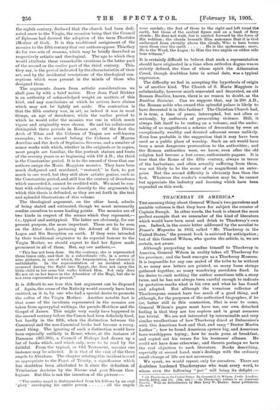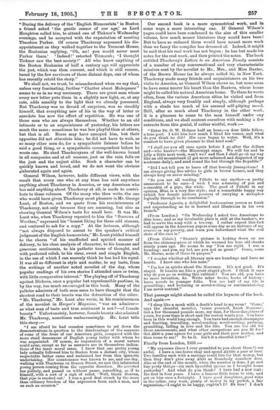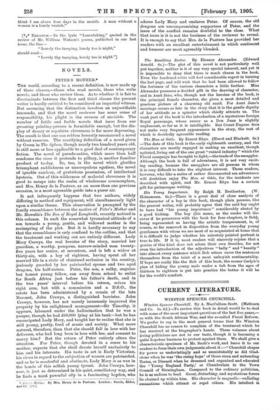THE amusing thing about General Wilson's two garrulous and amiable
volumes is that they have for subject the creator of Captain Bumph. In other words, the book is almost the most perfect example that we remember of the kind of literature which would have been meat and drink to Thackeray's own pen. Indeed, in the comic letter addressed by the novelist to Fraser's Magazine in 1853, called "Mr. Thackeray in the United States," the present book is satirised by anticipation ; but of this General Wilson, who quotes the article, is, we are certain, not aware.
Although purporting to confine himself to Thackeray in America, General Wilson in reality takes all Thackeray for his province; and the book emerges as a Thackeray Museum. It is impossible for any one sealed of the tribe to be without it, so many new letters are printed, so many loose strings gathered together, so many wandering anecdotes fixed. In his desire to omit nothing the author sometimes tells a story twice, and he has not always been careful enough to indicate by quotation-marks what is his own and what he has found and adopted. But although the voracious collector of Thackerayana cannot have too much of a good thing, and although, for the purposes of the authorised biographer, if he (or, better still in this connection, She) is ever to come, General Wilson's pages must have use, our own detached feeling is that they are too copious and in great measure too trivial. We are not interested by interminable and very similar recollections of how Thackeray dined at Delmonico's with this American host and that, and sang "Doctor Martin Luther "; how he found American oysters big, and American hero-worshippers trying; how he made puns at breakfast, and copied out his verses for his hostesses' albums. He could not have done otherwise; and therein perhaps we have the real objection to such literature. Books describing, especially at second band, men's dealings with the ordinary small change of life are not necessary.
We speak, we would repeat, only for ourselves. There are doubtless hardened Thackerayans who want every word, to whom even the following "jest" will bring its delight :—
" (1) Thackeray in t he United States. By General 3.0. Wilson_ 2 vols. London: Smith, Elder, and Co. [Ns. net.]—(2) Thackeray's Letters to am American Family. With an Introductiou by Miss Lucy W. Baxter. Same publishers. (fis. net.1 "During the delivery of the English Humourists ' in Boston a friend asked the gentle censor of our age,' as Lord Houghton called him, to attend one of Ticknor's Wednesday evenings, and he accepted with the expectation of meeting Theodore Parker. Of course Thackeray expressed his dis- appointment as they walked together to the Tremont House, the Bostonian replying, Oh, no! you would never meet Parker there.' 'Indeed!' !' retorted Titmarsh ; 'I thought Ticknor saw the best society!' All who know anything of the Boston Brahmins of half a century ago will appreciate the jest, which was then current, and which is still remem_ bered by the few survivors of those distant days, one of whom has recently retold the story."
We shall not, we trust, be misunderstood when we say that, unless very fascinating, further "Chatter about Makepeace " seems to us in no way necessary. There are great men whose every new letter puts them in a slightly new light, or, at any rate, adds sensibly to the light that we already possessed. But Thackeray was so devoid of surprises, was so steadily himself, that everything new of his in the way of letter or anecdote has now, the effect of repetition. He was one of those men who are always themselves. Whether to an old intimate or to an acquaintance of yesterday, his letters are much the same: sometimes he was less playful than at others, but that is all. Bores may have annoyed him, but their opposites did not stimulate him ; he did not have to wait, as so many other men do, for a sympathetic listener before he said a good thing, or a sympathetic correspondent before he wrote one. He shed Thackerayana of the well-known brand in all companies and at all seasons, just as the rain falls on the just and the unjust alike. Such a character can be quickly known and loved, and we do not want the obvious elaborated again and again.
General Wilson, however, holds different views, with the result that every one who at any time has said anywhere anything about Thackeray in America, or any American who has said anything about Thackeray at all, is made to contri- bute to these volumes. Of the many who thus write, the one who would have given Thackeray most pleasure is Mr. George Lunt, of Boston, and we quote from his reminiscences of Thackeray, not only because they are amusing, but also as showing General Wilson's taste for small beer. It was Mr.
Lunt who, when Thackeray repeated to him the "Sorrows of Werther," expressed his "honest liking for these odd stanzas, and ventured to ask for a copy." At the lectures, although "not always disposed to assent to the speaker's critical judgment of the English humourists," Mr. Lunt yielded himself to the charm "of his unaffected and spirited manner of delivery, to his close analysis of character, to his humane and
generous sentiments, to his pathetic turns of thought, and with profound relish, to his clear, sweet and simple English, in the use of which I can scarcely think he has had his equal. It was all so different in style and matter, to my taste, from the writings of another noted novelist of the day, whose popular readings of his own stories I attended once or twice, with little comparative interest." The playing off of Thackeray against Dickens, once a popular but reprehensible pastime, is, by the way, too much encouraged in this book. Many of the paltrier admirers of both men seem to have thought that the shortest road to their hearts was the detraction of the other. "Mr. Thackeray," Mr. Lunt also wrote, in his reminiscences of the novelist in Harper's Magazine, "was an admirer— as what man of taste and true sentiment is not P—of female beauty." Unfortunately, however, female beauty also admired Mr. Thackeray, sometimes embarrassingly. Mr. Lunt tells
this story :—
"I am afraid he had occasion sometimes to set down the demonstrations in question to the disadvantage of the manners of some of the freer of our American girls, compared with the more staid demeanour of English young ladies with whom he was acquainted. Of course, no imputation of a moral nature could arise, except as far as manners are in themselves indica- tions of the inner moral sense. I know that one pretty young lady actually followed him to Boston from a distant city, whose respectable father came and reclaimed her from this Quixotic undertaking. Her countenance was known to me, and one day, walking with Thackeray on Beacon Street, we mot this infatuated young person coming from the opposite direction. He accosted her politely, and passed on without pause, remarking, as if to himself, with a sort of a sigh of relief, Well, thank Heaven, that pipe is smoked out.' I was a good deal struck by the more than ordinary freedom of the expression from such a man, and on such an occasion." Our second book is a more symmetrical work, and in some ways a more interesting one. If General Wilson's pages could have been condensed to the size of this smaller volume, how much nearer literature they would have been !
But to have so reduced them would have meant more work than we fancy the compiler has dreamed of. Indeed, it might be said that his real work has not begun : he has but made his notes for the real work, and then printed the notes. The book entitled Thackeray's Letters to an American Family consists of a number of easy conversational and very characteristic missives sent by the novelist to Mr., Mrs., and Miss Baxter, of the Brown House (as he always called it), in New York. Thackeray made many friends and acquaintances on his two visits to America, as General Wilson shows us, but none seem to have come nearer his heart than the Baxters, whose house might be called his natural American home. To them he wrote often, from the various American cities he visited and from England, always very frankly and simply, although perhaps with a shade too much of his amused self-pitying mood. Still, after so much about Thackeray in the other work, it is a pleasure to come to the man himself under any conditions, and we shall content ourselves with making a few extracts from this genial, if rather wistful, work :— " Enter Dr. 0. W. Holmes half an hour,—a dear little fellow, a true poet. I told him how much I liked his versos, and what do you think ho did? His eyes began to water. Well, it's a comfort to have given pleasure to that kind soul."
"I shall see you all once again before I go after the dollars and—who knows?—the Mississippi snags. We will try and be jolly a little next week, won't we ? and then I shall go on my way like an old mountebank (I get more ashamed and disgusted of my nostrums daily), and send round the hat through the Republic."
"Did I not tell you to leave off that beecely jimnayshum ? I am always giving fine advice to girls in brown houses, and they always keep on never minding."
"So you are all reading Villette to one another—a pretty amusement to be sure—I wish I was a-hearing of you and a-smoakin of a pipo, the while. The good of Villette in my opinion, Miss, is a vory fine style; and a remarkable happy way (which few female authors possess) of carrying a metaphor logically through to its conclusion."
"Professor Agassiz, a delightful benhommious person as frank and unpretending as he is learned and illustrious in his own branch."
(From London.) "On Wednesday I asked two Americans to dine hero; and as my invaluable plate is still at the.banker's, we had to serve the soup with a tea-cup. I rather expect this fact will appear in the American papers some day as an instance of my avarice or my poverty, and warn you beforehand what the real state of the case is."
(From Calais.) " Sterne's picture is looking down on me from the chimney-piece at which he warmed his loan old shanks ninety years ago. He seems to say You are right. I was a humbug: and you, my lad, are you not as great ?' Come, come Mr. Sterne, none of these tu quoques."
"I wonder whether all literary men are humbugs and have no hearts. I know one who has none."
"I'm low in spirits about The Newcomes. It's not good. It's stupid. It haunts me like a great stupid ghost. I think it says why do you go on writing this rubbish ? You are old, you have no more invention, dm Write sober books, books of history : leave novels to younger folks. You see half of my life is grumbling ; and lecturing or novel-writing or sentimentalising I am never content."
That passage might almost be called the keynote of the book. And again :— " I sleep like a monk with a death's head in my room! Come,' says the cheerful monitor, 'rouse yourself, finish Newcomes. Gat a few thousand pounds more, my man, for those daughters of yours, for your time is short and the sexton wants you. You have been in this world long enough. You have had enough champagne and feasting, travelling, novel-reading, novel-writing, yawning, grumbling, falling in love and the like. You are too old for these amusements, and what other occupations are you fit for ? Get MOO a year apiece for your girls and their poor mother, and then come to me!' So be it. Isn't it a cheerful letter ? "
Finally from London, 1858 :— " My expenses (have I ever grumbled to you about them ?) are awful. I have a one-horse shay and spend £2,600 a year at least. Two families each with a carriage could live for that money, but then they don't give away £500 as Somebody somehow does. Also at the end of the month, when the number is done, I go and buy pooty things—six such byootiful spoons as I brought home yesterday ! And what do you think? I have had a now coat: the first in four years. I have a famous little horse to ride, and get on him once a fortnight. I have good daughters, good wino in the cellar, easy work, plenty of money in my pocket, a fair reputation,—I ought to be happy, oughtn't I? Rh hien! I don't








































 Previous page
Previous page